
70.
Phoenix
Wolfgang Amadeus Phoenix
[V2; 2009]
I find it somewhat bewildering that French popsters Phoenix, born out of the same scene as dance giants Daft Punk and electronic duo Air, took far longer than their counterparts to penetrate the “indie” consciousness. Their first three albums, United, Alphabetical, and It’s Never Been Like That, all followed a similar formula; each contained at least one killer single, a handful of middling numbers that straddle a fine line between dance floor potential and filler, and a form of self-indulgence in the shape of an elongated instrumental. Wolfgang Amadeus Phoenix is not particularly different, in this respect; the ubiquitous, flawless “1901” and the B-grade cinema-inspired “Lisztomania” are consistent with the group’s inestimable singles output, while two-parter “Love Like A Sunset” corresponds to the instrumental requisite. So why, then, is this record Phoenix’s crowning glory, its magnum opus, its moment of Grammy Award crossover? My theory is that on WAP the unexciting non-singles have evaporated, and have subsequently been replaced by more outrageously excellent pop fare. “Rome,” for example, begins innocuously before erupting into a spectacular outro, while the fast-paced closers “Girlfriend” and “Armistice” would have made a perfectly acceptable one-two opening punch on any other given day. Phoenix aren’t about the lyrics (I still haven’t a clue what they’re singing about), nor are they really about the highs; what resonates is their outstanding consistency, and their ability to churn out remarkably brilliant pop songs over and over again.
– Will Monotti
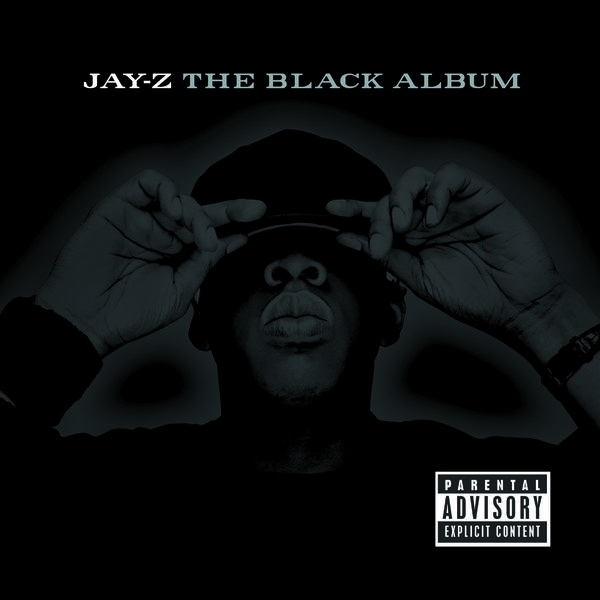
69.
Jay-Z
The Black Album
[Roc-A-Fella; 2003]
Sometimes Jay-Z’s megalomania can be a bit off-putting. The Black Album is self-congratulatory at its core, lyrically, but for good reason—Jay-Z had already affirmed his status in hip-hop as a living legend, so perhaps his high opinion of himself was not exactly unwarranted. Regardless, The Black Album is one of the most consistently interesting and entertaining hip-hop albums of the decade. This was probably Hov’s intention, enlisting an all-star cast of producers (Kanye West, Timbaland, The Neptunes, Eminem, Just Blaze, Rick Rubin) and giving the world two of the most well-known Jay-Z songs to date, “Dirt Off Your Shoulders” and “99 Problems.” The album’s influence continued to be felt via Danger Mouse mashing up The Black Album with The Beatles’ White Album. With the rest of hip-hop beginning to change their production style to include more drum machines and synths, The Black Album brazenly sticks with sampling as a means of production (primarily from classic R&B and soul sources) which gives it a timeless quality and establishes it as a mainstay as opposed to many of the transient rap/hip-hop albums released around the same time.
– Arika Dean

68.
TV on the Radio
Return to Cookie Mountain
[4AD / Interscope; 2006]
Return to Cookie Mountain is one of the few albums I like primarily for its production. I’m more likely to comment on how the songs sound as opposed to actually talking about the songs themselves. David Sitek paints the album with both delicate and harsh touches that make for huge emphasis at all the right points, in turn making for a vast beguiling maze of effects to get lost in.
I remember the anticipation that surrounded this album and the SNES-like animation of a man throwing a cookie on top of a pile of larger cookies that played over and over on their website. And then I heard “I Was A lover,” I literally couldn’t get my head around how anyone could possibly conceive a song like it. It’s thick, enduring, saddening, textural, insightful, foreboding among about a hundred other things. And that was just one track. As the album opened up (“blossomed” is too pretty a word for an album this dark) I only became more impressed and overtaken whether it be from the military drum clatter of “A Method,” the bellowing horns of “Blues From Down Here” or the mere presence of David Bowie on “Province.” It’s such a terrible cliché but how could anyone not want to return to Cookie Mountain after hearing it once?
– Ray Finlayson
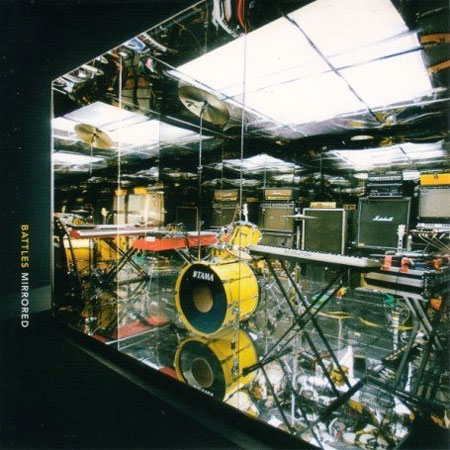
67.
Battles
Mirrored
[Warp; 2007]
Battles can’t be human, or at least from our time. One must be leery especially after either seeing drummer John Stanier reach up and strike his Zildjian K ride cymbal, which is ridiculously mounted a good meter above his head, or just hearing the band in action.
Stanier leads the band with aberrant, yet fierce drums. Guiding the band through an aggregation of varied time signatures and tempo changes. Atop this bold and steering rhythm are guitar and keyboard melodies combatting, yet meshing simultaneously. On Battles’ preceding EP releases, they were an instrumental band. On Mirrored, guitarist and keyboardist Tyondai Braxton contributes his vocals to the mix, but in classic Battles fashion – he makes it eccentric. He samples his voice and conceals it under layers of FX, then loops it, many times marginally out of time with the main riff.
As you listen, it’s apparent that the band has been influenced by a multitude of genres and sounds and weave traces of metal, hip-hop, IDM and jazz into their own, very distinct, work. It comes as no surprise, really, when it’s revealed that they are indeed human; rather, Tyondai is just the son of avant-garde composer Anthony Braxton.
– Evan Kaloudis
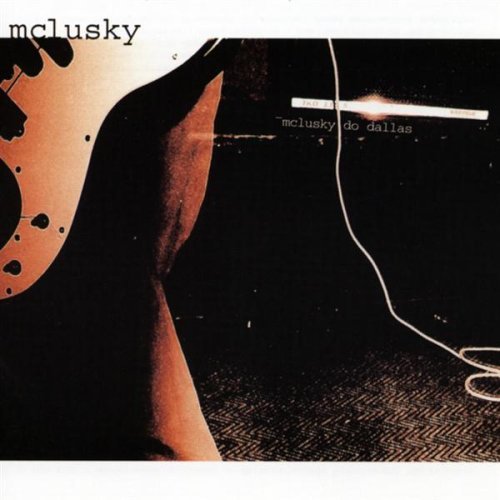
66.
Mclusky
Mclusky Do Dallas
[Too Pure; 2002]
Beginning with the cymbal tapping of “Lightsabre Cocksucking Blues,” soon to be punctured by elephantine guitars and Andy Falkous caterwauling lines like “I’m aching from fucking too much,” Mclusky Do Dallas is all pedal-to-the-proverbial-metal, every song arriving like a volcanic surge, melting your speakers and probably making your mother very, very angry if she’s in earshot. The intensity in Mclusky’s music would be all well and good, and fun enough, but what makes it essential is the endless wit behind the band’s lyrical jabbing, as well as the endlessly catching songs they marry it to. Anyone can make a “fuck you” song or record, but Mclusky do it in a way that’s as intelligent as it is hilarious, and entirely memorable. Really, it takes a special band to title a song “The World Loves Us and is Our Bitch,” and have it not sound the bad kind of ridiculous. It’s a shame that Mclusky’s star only burned for three records, but they left us with enough one liners to last a lifetime. Fuck this band, because they swear too much, indeed.
– Bill Delaney
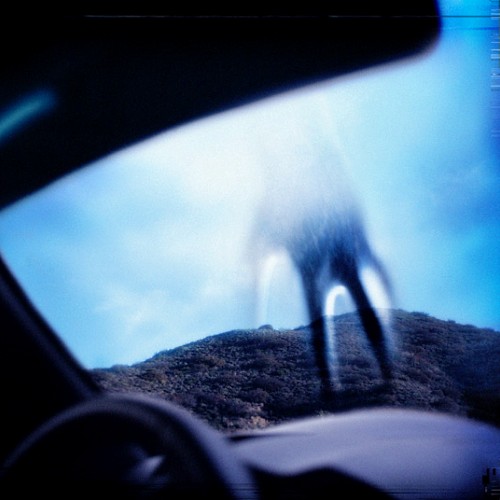
65.
Nine Inch Nails
Year Zero
[Interscope; 2007]
Trent Reznor is one of the most pivotal figures of the post-Napster era, for a lot of non-musical reasons. Since leaving Interscope in 2008, he has given away two NIN albums and 400 gigabytes of HD concert footage, which fans have recently edited into a stellar DVD release. But the real turning point, when Reznor transformed from successful and popular ‘90s survivor (which had looked like his ceiling for this decade, based on 2005’s subpar With Teeth) to new-media messiah was on Year Zero. Here, he backed his strongest and most challenging music since The Fragile with a complex, innovative viral marketing campaign. The album itself is one of Reznor’s finest, a darkly elegant, beat-heavy work that manages to be both his most difficult album and one of his most melodic. With Teeth may have been an artistic disappointment for Reznor, but it did accomplish the task of restoring his self-confidence post-rehab, and that increased sense of adventure is all over Year Zero, from the stunning post-apocalyptic ballad “In This Twilight” to ominous slow burners like “Me, I’m Not” and “The Great Destroyer.”
– Sean Highkin
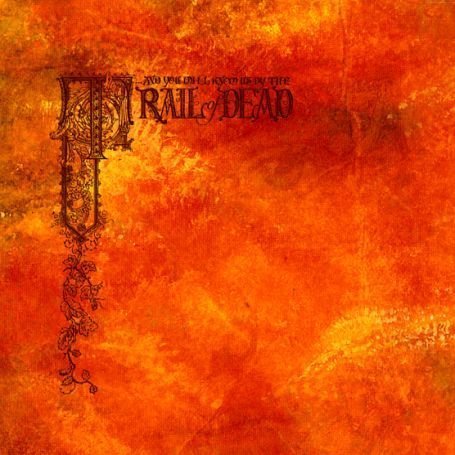
64.
…And You Will Know Us By the Trail of Dead
Source Tags & Codes
[Interscope; 2002]
It’s been discussed at length how sprawling and ambitious Source Tags & Codes is, so I’d like to skip all that and get to how this album will make you feel. It will make you feel like driving over the speed limit while yelling along at the top of your lungs even if your voice doesn’t quite reach the same register that Conrad Keely and Jason Reece can. It will make you feel like bowing your head because the crushing volume is like a physical weight. It will make you listen to one 10-second passage over and over because you can’t get enough of it. It will make you quote silly, overblown lyrics in your Facebook status.
It’s one of those albums that are greater than the sum of their parts; it could fall apart any second. The vocals are teetering on the edge of a cliff, and drums are just about to go off the rails, and the guitars are pressing too hard on the gas pedal and are flying around turns. But none of that really matters because the album transcends any kind of back story and just flat-out rocks.
– Ian Baker
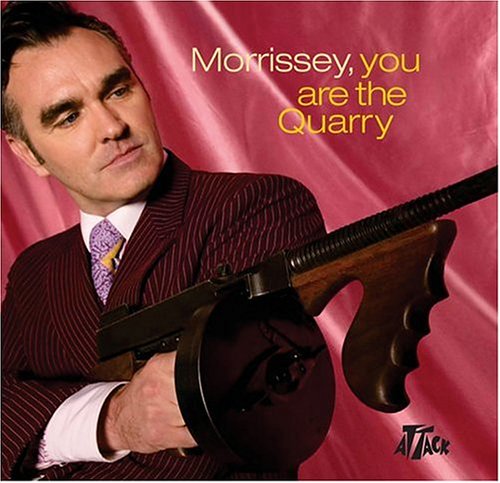
63.
Morrissey
You Are the Quarry
[Sanctuary / Attack; 2004]
In the first track on 2004’s You Are the Quarry, Morrissey’s seventh solo album and first following a seven-year layoff, the former Smiths frontman offers this critique of America: “the land of opportunity…but where the President is never black, female, or gay/and until that day, you’ve got nothing to say to me.” Now that that day has come, though, this collection of songs is in no way diminished, and right up right up there with Moz’s early post-Smiths classics Viva Hate and Your Arsenal. His voice only seems to get better as he gets older, and on this late-career masterpiece he rocks as convincingly as he ever has on the terrific “Irish Blood, English Heart” and “First of the Gang to Die.” Quarry also features Morrissey’s most direct address of his sexuality to date in “I Have Forgiven Jesus,” one of several gorgeously arranged ballads (standouts: “I’m Not Sorry,” “The World is Full of Crashing Bores”) that are the most lush music of his career.
– Sean Highkin
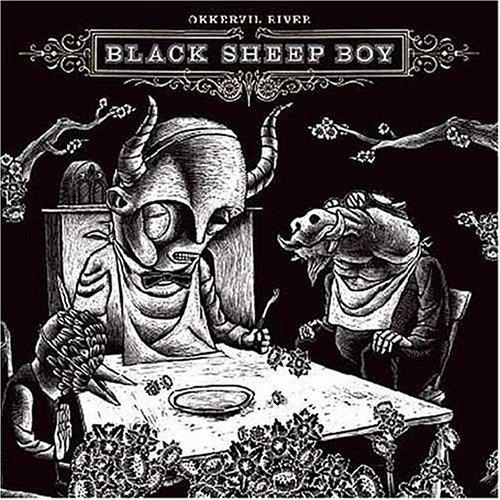
62.
Okkervil River
Black Sheep Boy
[Jagjaguwar; 2005]
Black Sheep Boy begins with a Tim Hardin cover, from which the album’s name and protagonist is appropriated – a short and pretty little acoustic song. “For Real,” the follow-up track, opens with the lines “Some nights I thirst for real blood, for real knives, for real cries” delivered in a sinister croon and you realise that the opener is a red herring in terms of sound and style for this album. It is there merely to introduce the character, which lyricist and vocalist Will Sheff then takes into his own possession for the remainder of the album and leads him down a dark path that includes murder and drugs.
Taken on their own, Sheff’s lyrics are a substantial body of work, but when combined with Okkervil River’s knack for tone and tune they have a winning combination. This is evident throughout the album, for example “So Come Back, I Am Waiting” is the Black Sheep Boy’s low-point of the album, his drug-addled and desperate mind state is brought into full and dramatic reality with the sweeping musical peaks and troughs, whereas the mid-album pairing of “A King And A Queen” and “A Stone” have their regal qualities emphasised by the delicate addition of mandolin and horns.
If there is one over-arching theme on this album it is obsession – either with violence, drugs, blood or even former lovers. This is an album that, if given time to flourish in your mind, will become an obsession of your own.
– Rob Hakimian
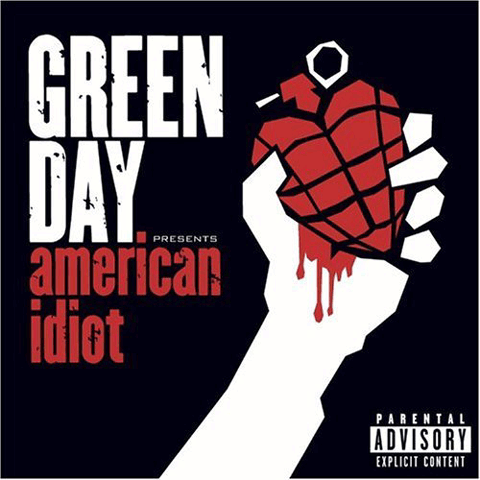
61.
Green Day
American Idiot
[Reprise; 2004]
American Idiot’s impact may be dulled at this point by radio overexposure and the inevitable backlash to any band being overly popular with people who shop at Hot Topic, but let the record show that, at a time in their career when they were dead to all but the most ardent ‘90s believers, Green Day pulled off one of the most successful reinventions in rock history. Coming six weeks before George W. Bush was reelected to a second term, Idiot painted a note-perfect portrait of post-9/11 America and cast these most unlikely of pop-punk survivors as honest-to-goodness successors to The Who and The Clash. At the time, it was unclear how much of its impact came from its context and how much came from the music, but over five years later, the album stands up as a smart, diverse, incredibly consistent collection of pop music. It spawned six radio smashes and ran itself into the ground in the minds of most people, but it deserved to be that big. Some albums (Thriller and Nevermind come to mind) achieve this kind of ubiquity because they’re just that good.
– Sean Highkin

